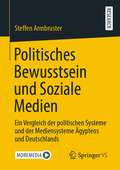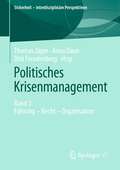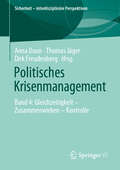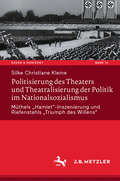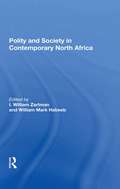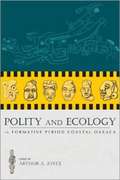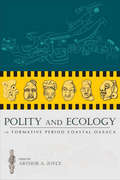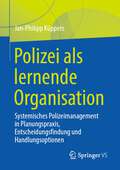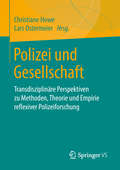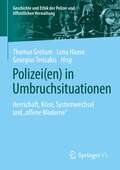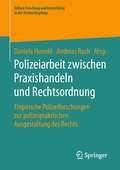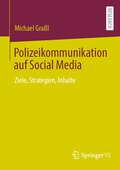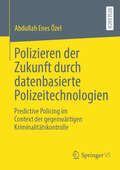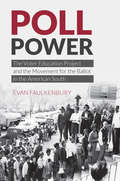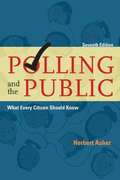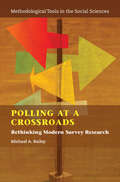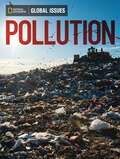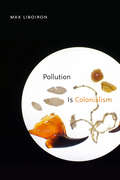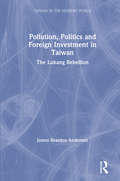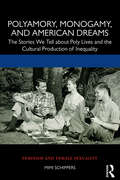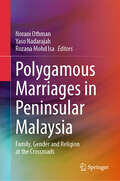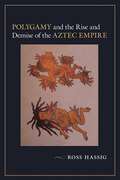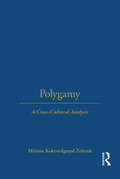- Table View
- List View
Politisches Bewusstsein und Soziale Medien: Ein Vergleich der politischen Systeme und der Mediensysteme Ägyptens und Deutschlands
by Steffen ArmbrusterPolitische Systeme determinieren andere Gesellschaftssysteme: Sie bringen etwa unterschiedlich ausgeprägte Mediensysteme hervor, deren Massenmedien unterschiedliche Funktionen für die Gesamtgesellschaft erbringen – je nach Typus auf dem Spektrum politischer Regime vom perfekten Totalitarismus bis hin zur embedded democracy. Systemtheoretisch betrachtet unterliegen die Subsysteme des Gesellschaftssystems demnach einer hierarchischen Logik – dies postuliert der hier entwickelte theoretische Ansatz der normativen Gebundenheit. Die Arbeit versucht dies anhand einer deskriptiven, deduktiven sowie komparativen Argumentation in einem internationalen most-different-Vergleich zwischen den politischen und den Mediensystemen Ägyptens und Deutschlands zu begründen. Zugleich finden sich in den Daten der empirischen Erhebung der Mediennutzung – insbesondere der Nutzung sozialer Netzwerke – und der politischen Einstellungen ägyptischer und deutscher Studierender Indizien für die theoretische Annahme. Der AutorSteffen Armbruster ist derzeit für den Bayerischen Rundfunk sowie die ARD als Korrespondent tätig und berichtet für Fernsehen, Hörfunk und Online aus dem Bodenseeraum. Er hat Journalistik, Politikwissenschaft und Philosophie an der Katholischen Universität Eichstätt-Ingolstadt studiert und unterrichtet dort immer wieder Studierende in der journalistischen Praxis.
Politisches Krisenmanagement: Band 3: Führung – Recht – Organisation (Sicherheit – interdisziplinäre Perspektiven)
by Thomas Jäger Anna Daun Dirk FreudenbergDer Band thematisiert Fragen von Führung, Recht und Organisation in Krisensituationen: Welche Ansätze gibt es für die Führung von Menschen in Krisen und welche kritischen Eigenschaften sollten führende Personen selbst reflektieren? Für welche Fälle wappnet das Grundgesetz und welche aktuellen Fragen stellen sich zwischen Cyberwar, künstlicher Intelligenz und Covid-19? Und welche Antworten diskutieren Organisationen, die kritische Infrastrukturen für unsere Gesellschaft bereitstellen? Die Autoren des Bandes beleuchten diese Aspekte aus Perspektiven von Wissenschaft, Behörden und Unternehmen.
Politisches Krisenmanagement: Band 4: Gleichzeitigkeit – Zusammenwirken – Kontrolle (Sicherheit – interdisziplinäre Perspektiven)
by Thomas Jäger Anna Daun Dirk FreudenbergEs kennzeichnet gegenwärtige Wahrnehmungen, dass sich die verschiedenen krisenhaften Entwicklungen, seien sie im Ursprung biologischer (Corona), technischer (Klima), kultureller (Identität) oder grundlegend politischer (Macht und Legitimität) Natur, in unklarer Weise aufeinander beziehen und zu vermischen scheinen. Und je stärker die eigentlichen Merkmale einer Krise – die fundamentale Unsicherheit und die Überforderung etablierter Managementstrategien – eine Situation dominieren, desto krasser können Glaubenssätze und Narrative auseinanderdriften und desto unvereinbarer werden die Rezepte für das jeweils geeignete Krisenmanagement. Die Unkenntnis über das Coronavirus rechtfertigte im Grunde jegliche Strategie der Krisenbewältigung, vom Laissez-faire bis zur absoluten Kontrolle, alles dazwischen oder auch fortwährende Richtungsanpassungen („Auf Sicht fahren“). Gleichzeitig bot sie die Voraussetzungen für eine tiefgreifende Politisierung des politisch-administrativen Krisenmanagements. Die Beiträge dieses Bandes diskutieren Probleme von Regierung, Verwaltung und Kritischen Infrastrukturen in der Corona-Pandemie.
Politisierung des Theaters und Theatralisierung der Politik im Nationalsozialismus: Müthels „Hamlet“-Inszenierung und Riefenstahls „Triumph des Willens“ (Szene & Horizont. Theaterwissenschaftliche Studien #13)
by Silke Christiane KleineVorliegende Arbeit beschäftigt sich mit den Fragen nach der Politisierung der Bühne während des „Dritten Reiches“ und der Nutzbarmachung theatraler Operativität für die politische nationalsozialistische Massenversammlung anhand der Analysen einer massenwirksamen Hamlet-Inszenierung (Lothar Müthel, Berlin 1936) und von Leni Riefenstahls filmischer Dokumentation des „Reichsparteitags der Einheit und Stärke“ 1934 („Triumph des Willens“). Während sich das Medium der Theaterbühne als nicht sonderlich fruchtbar für propagandistische Zwecke erwiesen hatte, ereignete sich das „eigentliche“ Theater des „Dritten Reiches“ auf den Plätzen und in den Arenen des politischen Massenauftritts. Es geschah also ein Transfer theatraler Mittel und Operativität hin zu öffentlichen Massenveranstaltungen des Regimes. Theatrale, dramaturgische Elemente der Theaterbühne erwiesen sich in Kombination mit massenpsychologischen Grundmechanismen als besonders tragfähig, sodass man sagen kann, dass es sich bei NS-tendenziösen Theaterinszenierungen um Präfigurationen des politischen Massenauftritts handelte. Dies wird anhand öffentlicher Veranstaltungen im Nationalsozialismus erörtert; diese werden im Hinblick auf theatrale Kategorien wie der Ausgestaltung/Architektur des Raumes, Auditivität (Stimme und Rede, die Rolle der Lautsprechertechnologie), Licht/Beleuchtung und Requisiten analysiert. Neben diesen Aspekten der Theaterregie kamen (hier: pseudo-) religiöse Aspekte der Kirchenregie zum Tragen. Leni Riefenstahls filmische Dokumentation „Triumph des Willens“ zeigt eindrücklich die Kulmination der bis dato in vielen Auftritten erprobten massenpsychologischen Dramaturgie im Großereignis von Nürnberg. Zudem entgrenzt Riefenstahl das Ereignis durch die Reproduzierbarkeit des Mediums „Film“. Einerseits stellt der Film den Initiationsprozess für die jungen Nationalsozialisten auf dem „Reichsparteitag“ in Nürnberg dar, andererseits war die „Lektüre“ des Films gleichsam ein Initiationsprozess für den Zuschauer; das filmische Zeugnis Leni Riefenstahls konnte so die Präsenzteilnahme am „Reichsparteitag der Einheit und Stärke“ ersetzen.
Polity And Society In Contemporary North Africa
by I. William Zartman William Mark Habeeb I William ZartmanIn the twenty-five years since the last comprehensive book on state and society in North Africa was published, the nations of the Maghrib have undergone profound social, political, and economic changes. The region has, for example, experienced one of the highest population growth rates in the world, accompanied by a dramatic increase in migration t
Polity and Ecology in Formative Period Coastal Oaxaca
by Arthur A. JoyceEncapsulating two decades of research, Polity and Ecology in Formative Period Coastal Oaxacais the first major treatment of the lower Río Verde region of Oaxaca, investigating its social, political, and ecological history. Tracing Formative period developments from the earliest known evidence of human presence to the collapse of Río Viejo (the region's first centralized polity), the volume synthesizes the archaeological and paleoecological evidence from the valley. This period saw the earliest agricultural settlements in the region as well as the origins of sedentism and social complexity, and witnessed major changes in floodplain and coastal environments that expanded the productivity of subsistence resources. The book addresses theoretically significant questions of broad relevance such as the origins and spread of agriculture, the social negotiation of complex political formations, the effects of long-distance trade and interaction, the macroregional effects of landscape change, and prehispanic ideology and political power. Focusing on questions of interregional interaction, environmental change, and political centralization, Polity and Ecology in Formative Period Coastal Oaxacaprovides a comprehensive understanding of the Formative period archaeology of this important and long neglected region of Oaxaca.
Polity and Ecology in Formative Period Coastal Oaxaca (G - Reference, Information And Interdisciplinary Subjects Ser.)
by Arthur A. JoyceEncapsulating two decades of research, Polity and Ecology in Formative Period Coastal Oaxaca is the first major treatment of the lower Río Verde region of Oaxaca, investigating its social, political, and ecological history. Tracing Formative period developments from the earliest known evidence of human presence to the collapse of Río Viejo (the region's first centralized polity), the volume synthesizes the archaeological and paleoecological evidence from the valley. This period saw the earliest agricultural settlements in the region as well as the origins of sedentism and social complexity, and witnessed major changes in floodplain and coastal environments that expanded the productivity of subsistence resources. The book addresses theoretically significant questions of broad relevance such as the origins and spread of agriculture, the social negotiation of complex political formations, the effects of long-distance trade and interaction, the macroregional effects of landscape change, and prehispanic ideology and political power. Focusing on questions of interregional interaction, environmental change, and political centralization, Polity and Ecology in Formative Period Coastal Oaxaca provides a comprehensive understanding of the Formative period archaeology of this important and long neglected region of Oaxaca.
Polizei als lernende Organisation: Systemisches Polizeimanagement in Planungspraxis, Entscheidungsfindung und Handlungsoptionen
by Jan-Philipp KüppersIst das Polizeimanagement lernfähig? Wie äußert sich das in seinem strategischen und operativen Handlungsumfeld? Und: Welchen Einfluss haben institutionell gewachsene Automatismen darauf? Die Polizei als flexible und adaptive Einsatzorganisation ist mit komplexen dynamischen Handlungsfeldern, Risiken und Gefährdungspotenzialen konfrontiert. Neben der täglichen Routinearbeit kommen Demonstrationen, Amokläufe, terroristische Anschläge hinzu. Die Polizei als lernende Organisation sollte daher stets auf unerwartete Ereignisse und sicherheitsrelevante Entwicklungen vorbereitet sein, um sie frühzeitig zu erkennen und folgenarm zu bewältigen. Anhand von drei praktischen Fallbeispielen wird untersucht, ob und wie operative Polizeieinsätze systemorientiert nach Kriterien der lernenden Organisation ablaufen können und wo Verbesserungspotenziale für unerwartete und kritische Situationen möglich oder notwendig sind.
Polizei und Gesellschaft: Transdisziplinäre Perspektiven zu Methoden, Theorie und Empirie reflexiver Polizeiforschung
by Christiane Howe Lars OstermeierDarstellungen der Polizei in der Polizeiforschung gleichen häufig den Schilderungen der sprichwörtlichen blinden Männer, die einen Elefanten untersuchen und dabei jeweils etwas völlig Unterschiedliches beschreiben. Eine dominierende und leitende Fragestellung dabei ist meist, ob sich die empirischen Ergebnisse mit als ideal definierten Vorstellungen von der Polizei decken oder nicht. Für die sich hier auftuende Kluft werden dann jeweils Erklärungen gesucht. Die Beiträge in diesem Band gehen darüber hinaus und positionieren sich zwischen etablierten Positionen, die „für“, „über“ oder „gegen“ die Polizei forschen. Aus theoretisch wie methodisch unterschiedlichen Perspektiven wird thematisiert, wie Erkenntnis in der Polizeiforschung durch den sozialen und je eigenen wissenschaftlichen Kontext geprägt und in ihm verankert ist.
Polizei: Herrschaft, Krise, Systemwechsel und „offene Moderne“ (Geschichte und Ethik der Polizei und öffentlichen Verwaltung)
by Georgios Terizakis Thomas Grotum Lena HaaseDer Umbruch steht für einen tiefgreifenden Wandel, der sich auf unterschiedlichen Ebenen vollziehen kann. Bezogen auf die Polizei spielen neben politischen Zäsuren auch gesellschaftliche und kulturelle Umbrüche eine wesentliche Rolle. Dabei kann die Institution zum Objekt der Forschung oder aber als Subjekt (Akteur) in einer historischen Konstellation analysiert werden. Dieser Ansatz wird in dem Band in internationaler und interdisziplinärer Perspektive vom 18. Jahrhundert bis zur Gegenwart verfolgt.
Polizeiarbeit zwischen Praxishandeln und Rechtsordnung: Empirische Polizeiforschungen zur polizeipraktischen Ausgestaltung des Rechts (Edition Forschung und Entwicklung in der Strafrechtspflege)
by Daniela Hunold Andreas RuchDer vorliegende Band vereint aktuelle, interdisziplinäre Forschungen, welche sich im Kern mit dem Handeln der Polizei als soziales Phänomen beschäftigen. In diesem Zusammenhang greifen die Autoren/innen auch Fragen nach den rechtlichen Rahmenbedingungen polizeilichen Handelns sowie Einflüssen polizeilicher Praktiken auf Ausgestaltungen des Rechts auf. Ziel des Buches ist es, einen breiten Überblick über die hiesige, im Vergleich zu anderen Ländern immer noch recht rudimentär aufgestellte Polizeiforschung zu geben. Die Zusammenstellung praxisorientierter Perspektiven verfolgt dabei auch den Zweck, einen Baustein für eine Theorie der Praxis der Polizei zu liefern.
Polizeikommunikation auf Social Media: Ziele, Strategien, Inhalte
by Michael GraßlWitzig, unterhaltend, transparent – Zuschreibungen, die vor wenigen Jahren für die Außendarstellung der Polizei undenkbar waren. Dank Social Media gehören diese Eigenschaften nun zum festen Kommunikationsrepertoire der Polizei. Wie die Polizei in Deutschland konkret auf Social Media kommuniziert, war bisher allerdings nahezu unerforscht. Ebenso war wenig bekannt über die Ziele und Strategien, die die Polizei in Sozialen Netzwerken verfolgt. Das Buch beantwortet diese Fragen mit der Hilfe von qualitativen Leitfadeninterviews mit Social-Media-Verantwortlichen der Polizei und einer quantitativen Inhaltsanalyse von Posts auf Facebook, Twitter und Instagram sowie von Instagram-Storys. Die Ergebnisse ermöglichen einen detaillierten Blick auf die strategische und inhaltliche Social-Media-Kommunikation, die das Berufsfeld der Polizei-PR grundlegend verändert. Einerseits kann die Polizei durch Social Media unabhängiger denn je in Meinungsbildungsprozesse der digitalen Welt eingreifen, andererseits erheben Hate Speech, Fake News und Influencer völlig neue Ansprüche an die Kommunikationskompetenz. Die Ergebnisse liefern damit nicht nur einen gesamtheitlichen Einblick in die polizeiliche Kommunikationsweise, sondern auch einen wichtigen Impuls für die gesamtgesellschaftliche Debatte darüber, wie Polizeikommunikation auf Social Media in unserer Demokratie bewertet werden kann.
Polizieren der Zukunft durch datenbasierte Polizeitechnologien: Predictive Policing im Context der gegenwärtigen Kriminalitätskontrolle
by Abdullah Enes ÖzelPredictive Policing wird meist auf die zugrundeliegenden Datenverarbeitungstechnologien reduziert und auf Grundlage der diesen Technologien zugeschriebenen Eigenschaften wie Effizienz, Wirksamkeit, Neutralität, Geschwindigkeit usw. legitimiert. In Wirklichkeit ist Predictive Policing jedoch ein Knotenpunkt, worin Computertechnologien, sozio- ökonomische Kräfte, institutionelle Bedürfnisse, ideologische Prämissen, gouvernementale Rationalitäten und Strategien sowie wissenschaftliche und gesellschaftliche Diskurse gebündelt werden. Statt die Technologie als Ausgangspunkt auszuwählen, als ob sie eine kohärente Substanz hätte, ist es notwendig zu untersuchen, mit welchen Kräfteverhältnissen, Arten der Verständlichkeit und Rationalitäten der Gouvernementalität diese Technologie in Berührung kommt und wie sie sowohl durch diese Verschmelzungen ermöglicht wird, als auch wie sie durch diese materiellen und immateriellen Verschmelzungen richtungsweisend wirkt. Das Ziel dieses Buches liegt darin, Predictive Policing sowohl im Rahmen des Wandels sozialer Kontrolle als auch der gegenwärtigen Strategien der Kriminalitätskontrolle zu verorten, es als ein durch eine dynamische Wechselbeziehung zwischen verschiedenen heterogenen, materiellen und immateriellen Faktoren determiniertes Phänomen zu bearbeiten und auf diese Weise eine sozusagen „fundamentale“ Kritik an Predictive Policing zu betreiben.
Poll Power: The Voter Education Project and the Movement for the Ballot in the American South (Justice, Power, and Politics)
by Evan FaulkenburyThe civil rights movement required money. In the early 1960s, after years of grassroots organizing, civil rights activists convinced nonprofit foundations to donate in support of voter education and registration efforts. One result was the Voter Education Project (VEP), which, starting in 1962, showed far-reaching results almost immediately and organized the groundwork that eventually led to the Voting Rights Act of 1965. In African American communities across the South, the VEP catalyzed existing campaigns; it paid for fuel, booked rallies, bought food for volunteers, and paid people to canvass neighborhoods. Despite this progress, powerful conservatives in Congress weaponized the federal tax code to undercut the important work of the VEP. Though local power had long existed in the hundreds of southern towns and cities that saw organized civil rights action, the VEP was vital to converting that power into political motion. Evan Faulkenbury offers a much-needed explanation of how philanthropic foundations, outside funding, and tax policy shaped the southern black freedom movement.
Polling and Public Opinion
by Peter Marshall ButlerThe importance of polling public opinion is widely recognized today. Indeed, it is sometimes argued that in mass societies, polls have also become an important medium for communicating ideas and beliefs, especially since many people have become less involved in community organizations and interest groups that formerly connected them to events and issues. Polling and Public Opinion examines the impact that polls have on the thoughts and behaviour of the public.Peter M. Butler considers the power of public opinion polls as an element of mass persuasion in media stories, advertising, and government policy. Using such controversial issues as free trade, health care, same-sex marriage, and national security, Butler argues that popular opinion on such hot-button topics as these can be guided and changed according to how polls are interpreted for and presented to the public. As well as analyzing the impact of polls on the public, Butler is concerned with demystifying the methods by which opinions are collected, showing that the techniques used to determine public opinion can be just as selective as those by which the results are disseminated.Focusing on many of the vital topics of our time, Polling and Public Opinion is an in-depth look at the rise of one of the most important but least understood methods by which politicians and governments gauge the popular will.
Polling and the Public: What Every Citizen Should Know (7th edition)
by Herbert AsherHow many of our answers to pollsters' questions are pure lies? Why do election predictions go terribly wrong? Asher (political science emeritus, Ohio State U.) updates his classic with new research and current events as he helps undergraduates and general readers understand what polls are, how they work, and what they do. He closely describes, with examples, the complicated relationship between the public and the polls, the problem with instability and a lack of opinion, the tricks of the trade in developing and arranging questions, sampling techniques and pitfalls, interviewing and data collection procedures, the ways in which the media uses polls, and the impact of polls on elections and democracy. One of the best chapters covers how to analyze and interpret polls. Each chapter includes exercises and Asher contributes web sites and references. Annotation ©2007 Book News, Inc., Portland, OR (book news. com)
Polling at a Crossroads: Rethinking Modern Survey Research (Methodological Tools in the Social Sciences)
by Michael A. BaileySurvey research is in a state of crisis. People have become less willing to respond to polls and recent misses in critical elections have undermined the field's credibility. Pollsters have developed many tools for dealing with the new environment, an increasing number of which rely on risky opt-in samples. Virtually all of these tools require that respondents in each demographic category are a representative sample of all people in each demographic category, something that is unlikely to be reliably true. Polling at a Crossroads moves beyond such strong limitations, providing tools that work even when survey respondents are unrepresentative in complex ways. This book provides case studies that show how to avoid underestimating Trump support and how conventional polls exaggerate partisan differences. This book also helps us think in clear and sometimes counterintuitive ways and points toward simple, low-cost changes that can better address contemporary polling challenges.
Polls, Pollsters, and Public Opinion: A Guide for Decision-Makers (Methodological Tools in the Social Sciences)
by Clifford Young Kathryn ZiemerA vast literature exists on theories of public opinion - how to measure, analyze, predict, and influence it; however, there is no synthesis of best practices for interpreting public opinion: existing knowledge is disparate and spread across many disciplines. Polls, Pollsters, and Public Opinion presents a systematic analytical approach for understanding, predicting, and engaging public opinion. It tells the story through the eyes of the pollster and draws an analytical road map for examining public opinion, both conceptually and practically. Providing a theoretical and conceptual foundation, as well as debunking popular myths, this book delves into the science of polling, offering tools analysts can use to assess the quality of polls. It also introduces methods that can be used to predict elections and other socio-political outcomes while understanding the nuances of messaging, engaging, and moving public opinion.
Pollution Is Colonialism
by Max LiboironIn Pollution Is Colonialism Max Liboiron presents a framework for understanding scientific research methods as practices that can align with or against colonialism. They point out that even when researchers are working toward benevolent goals, environmental science and activism are often premised on a colonial worldview and access to land. Focusing on plastic pollution, the book models an anticolonial scientific practice aligned with Indigenous, particularly Métis, concepts of land, ethics, and relations. Liboiron draws on their work in the Civic Laboratory for Environmental Action Research (CLEAR)—an anticolonial science laboratory in Newfoundland, Canada—to illuminate how pollution is not a symptom of capitalism but a violent enactment of colonial land relations that claim access to Indigenous land. Liboiron's creative, lively, and passionate text refuses theories of pollution that make Indigenous land available for settler and colonial goals. In this way, their methodology demonstrates that anticolonial science is not only possible but is currently being practiced in ways that enact more ethical modes of being in the world.
Pollution, Politics and Foreign Investment in Taiwan: Lukang Rebellion
by James Reardon-AndersonLukang is a sleepy provincial town on the east coast of Taiwan. The Lukang "rebellion" was a series of well-organised mass demonstrations in 1986 and 1987 to block construction by the DuPont Corporation of a titanium dioxide plant nearby. If this protest had occurred just a few years earlier, no doubt it would have been crushed by a powerful government determined to promote development at any cost. If it had been a few years later, it probably would have passed unnoticed. But it came at a time just when environmental consciousness in Taiwan had reached a critical mass and as the government was introducing political reforms allowing unprecendented scope to new forms of civil action. In this atmosphere, a handful of determined, capable activists, bent on keeping a giant multinational corporation out of their "old home", focused the attention of the entire island on Lukang, raised the national consciousness about threats to the natural environment, and challenged the rules that government officials and industrial leaders in Taiwan had come to take for granted. The Lukang rebellion was one of those small events with large consequences that make for interesting and significant history.
Polyamory, Monogamy, and American Dreams: The Stories We Tell about Poly Lives and the Cultural Production of Inequality (Feminism and Female Sexuality)
by Mimi SchippersThis book introduces "the poly gaze" as a cultural tool to examine how representations of polyamory and poly lives reflect or challenge cultural hegemonies of race, class, gender, and nation. What role does monogamy play in American Identity, the American dream, and U.S. exceptionalism? How do the stories we tell about intimate relationships do cultural and ideological work to maintain and legitimize social inequalities along the lines of race, ethnicity, nation, religion, class, gender and sexuality? How might the introduction of polyamory or consensually non-monogamous relationships in the stories we tell about intimacy confound, disrupt or shift the meaning of what constitutes a good, American life? These are the questions that Mimi Schippers focuses on in this original and engaging study. As she develops the poly gaze, Schippers argues for a sociologically informed and cultivated lens with which anyone, regardless of their experiences with polyamory or consensual non-monogamy, can read culture, media images, and texts against hegemony. This will be a key text for researchers and students in Gender Studies, Queer Studies, Cultural Studies, Critical Race Studies, Media Studies, American Studies and Sociology. This book is accessible and indispensable reading for undergraduate student and postgraduates wanting to gain greater understanding of debates around the key concept of heteronormativity.
Polygamous Marriages in Peninsular Malaysia: Family, Gender and Religion at the Crossroads
by Norani Othman Yaso Nadarajah Rozana Mohd IsaThis book presents the first national study of the practice of polygamy undertaken amongst Malay Muslims, contextualised within the broader social, legal, and political context of Malaysia. A collaboration between the Sisters in Islam NGO and three universities in Malaysia, it examines the perspectives of both men and women through quantitative and qualitative data analysis of over 1,200 surveys and more than 60 in-depth interviews charting the legal, financial, social, and emotional impacts of polygamy. It incorporates both progressive Islamic scholarly thought and the unique sociologically rich perspectives of the study respondents. In doing so, the data serves to strengthen advocacy for awareness and law reforms within Islamic jurisprudence frameworks and institutions. As one of the most comprehensive surveys ever conducted on polygamy in a Muslim society, this represents a major tour de force within a little explored field with tremendous potential for societal impact. This book is relevant to academics and graduate students seeking a deeper understanding of the issues related to Muslim polygamous marriage and to researchers within the broader fields of gender studies, family studies, Islamic studies, and Islamic legal studies. It is also a landmark resource for activists and policymakers seeking to advocate on behalf of marginalised groups—particularly women and children in polygamous families.
Polygamy and the Rise and Demise of the Aztec Empire
by Ross HassigThis provocative examination of Aztec marriage practices offers a powerful analysis of the dynamics of society and politics in Mexico before and after the Spanish conquest. The author surveys what it means to be polygynous by comparing the practice in other cultures, past and present, and he uses its demographic consequences to flesh out this understudied topic in Aztec history. Polygyny provided Aztec women with opportunities for upward social mobility. It also led to increased migration to Tenochtitlan and influenced royal succession as well as united the empire. Surprisingly, the shift to monogamy that the Aztecs experienced in a single generation took over a millennium to occur in Europe. Hassig&’s analysis sheds new light on the conquest, showing that the imposition of monogamy—rather than military might, as earlier scholars have assumed—was largely responsible for the strong and rapid Spanish influence on Aztec society.
Polygamy: A Cross-Cultural Analysis
by Miriam Koktvedgaard ZeitzenForms of plural marriage, or polygamy, are practiced within most of the world's cultures and religions. The amazing variation, versatility and adaptability of polygamy underscore that it is not just an exotic non-Western practice, but also exists in modern Western societies. Polygamy: A Cross-cultural Analysis provides an examination and analysis of historical and contemporary polygamy. It outlines polygamy's place in anthropological theory and its rich sociocultural diversity in countries ranging from the USA and UK to Malaysia, India, regions of Africa and Tibet. Polygamy also addresses often difficult and controversial issues facing modern polygamists, such as prejudice, HIV/AIDS and women's emancipation. Polygamy: A Cross-cultural Analysis offers an anthropological overview of the fascinating yet often misunderstood institution of polygamy.
